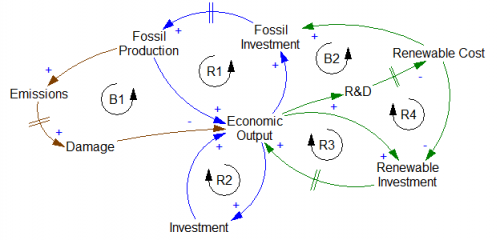Roy Spencer on reducing emissions by increasing emissions:
COL: Let’s say tomorrow, evidence is found that proves to everyone that global warming as a result of human released emissions of CO2 and methane, is real. What would you suggest we do?
SPENCER: I would say we need to grow the economy as fast as possible, in order to afford the extra R&D necessary to develop new energy technologies. Current solar and wind technologies are too expensive, unreliable, and can only replace a small fraction of our energy needs. Since the economy runs on inexpensive energy, in order to grow the economy we will need to use fossil fuels to create that extra wealth. In other words, we will need to burn even more fossil fuels in order to find replacements for fossil fuels.
On the face of it, this is absurd. Reverse a positive feedback loop by making it stronger? But it could work, if given the right structure – a relative quit smoking by going in a closet to smoke until he couldn’t stand it anymore. Here’s what I can make of the mental model:
 Spencer’s arguing that we need to run reinforcing loops R1 and R2 as hard as possible, because loop R3 is too weak to sustain the economy, because renewables (or more generally non-emitting sources) are too expensive. R1 and R2 provide the wealth to drive R&D, in a virtuous cycle R4 that activates R3 and shuts down the fossil sector via B2. There are a number of problems with this thinking.
Spencer’s arguing that we need to run reinforcing loops R1 and R2 as hard as possible, because loop R3 is too weak to sustain the economy, because renewables (or more generally non-emitting sources) are too expensive. R1 and R2 provide the wealth to drive R&D, in a virtuous cycle R4 that activates R3 and shuts down the fossil sector via B2. There are a number of problems with this thinking.
- Rapid growth around R1 rapidly grows environmental damage (B1) – not only climate, but also local air quality, etc. It also contributes to depletion (not shown), and with depletion comes increasing cost (weakening R1) and greater marginal damage from extraction technologies (not shown). It makes no sense to manage the economy as if R1 exists and B1 does not. R3 looks much more favorable today in light of this.
- Spencer’s view discounts delays. But there are long delays in R&D and investment turnover, which will permit more environmental damage to accumulate while we wait for R&D.
- In addition to the delay, R4 is weak. For example, if economic growth is 3%/year, and all technical progress in renewables is from R&D with a 70% learning rate, it’ll take 44 years to halve renewable costs.
- A 70% learning curve for R&D is highly optimistic. Moreover, a fair amount of renewable cost reductions are due to learning-by-doing and scale economies (not shown), which require R3 to be active, not R4. No current deployment, no progress.
- Spencer’s argument ignores efficiency (not shown), which works regardless of the source of energy. Spurring investment in the fossil loop R1 sends the wrong signal for efficiency, by depressing current prices.
In truth, these feedbacks are already present in many energy models. Most of those are standard economic stuff – equilibrium, rational expectations, etc. – assumptions which favor growth. Yet among the subset that includes endogenous technology, I’m not aware of a single instance that finds a growth+R&D led policy to be optimal or even effective.
It’s time for the techno-optimists like Spencer and Breakthrough to put up or shut up. Either articulate the argument in a formal model that can be shared and tested, or admit that it’s a nice twinkle in the eye that regrettably lacks evidence.

Maybe I’m missing something but what about
– merit order effect where renewables bring down the wholesale price of electricity
– in many markets renewables are at grid parity or will be in a couple of years
– research shows that the indirect subsidies to coal outweigh the value from burning it.
Generally I agree, though if you look outside the electric power system, it’s easier to make a case that noncarbon sources are still more expensive.
Obviously, if you count the social cost of carbon, fossil sources look much worse.
What I was trying to do here is point out that, even if you make the most favorable assumptions for continued use of fossil fuels, the idea that using more FF is the right way to decrease FF emissions is pretty stupid.